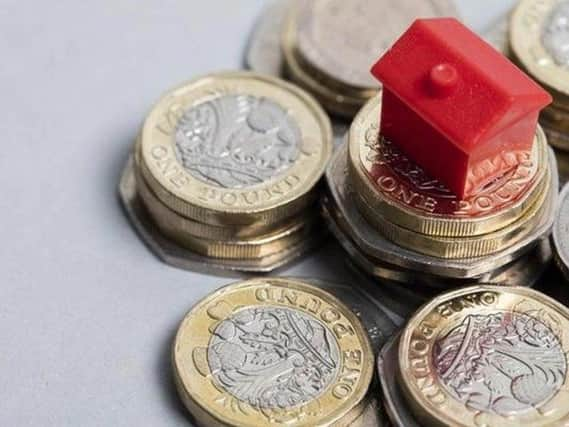Council Tax increase agreed for Aberdeenshire


It means that a Band D property (considered to be the ‘average’) will be set at £1,393.42 for the year. In context, that means it would go up by £1.03 per week for people who pay over 10 months. On top of that there will be Scottish Water charges applied. The new amounts will come into effect from 1st April.
The council also agreed to limit an increase to rent charges to 2.5% from April 1. This means that the current average weekly rent of £85.37 will rise by £2.13 to £87.50.
Advertisement
Hide AdAdvertisement
Hide AdThe new Council Tax figure will now be included in the Medium Term Financial Strategy and the 2023/24 Revenue Budget to be discussed by Full Council on March 9.
During discussions, councillors were provided with a range of potential increases per property banding from 3% to 10%, all of which were discussed and debated. While it was fully acknowledged that the cost of living and significant rises in energy bills were having a major impact on the region’s households, it was also recognised that the council is under extreme budget pressures and seeing an ever-rising demand for its services.
The Opposition group tabled a 6% increase led by Cllr Gwyneth Petrie, seconded by Cllr Alison Evison, also acknowledging the impact on residents and recognised where people are struggling. Nothing was being proposed lightly, and the group said that they would bring forward proposals to help people not already being reached by Council Tax reductions or support when Full Council next meets in March.
When it came to the vote, 43 of the councillors voted for the 4% increase, 22 voted for the amendment of a 6% rise and there was one no vote. A 4% increase from 1st April was approved.
Council Leader, Cllr Mark Findlater, said: “Every day we hear the stories of people struggling to find enough money to cover rent, food, heating and other costs. We know and appreciate that residents are having to adjust their spending in order to cover the basics.
“As a council, we are facing similar challenges with rising costs affecting all our services. Our energy bill alone is expected to be up to 40% higher than 2022/33 - increasing a massive £14m since 2021. We are facing high inflation, directly affecting the costs of everything we buy, from the products we need for road repairs, to construction costs and food for school meals.
“Demand for our services continues to grow. Our budgets are under pressure and we need to balance the needs of our residents with what we can afford.”
Deputy Leader Cllr Anne Stirling said: “We are all aware of the real challenges faced by residents with the rising cost of living. Household budgets are tight, there is greater demand on foodbanks, we know that people in our communities are having to make decisions to heat or eat – it is a sad and worrying position that we find ourselves in.
Advertisement
Hide AdAdvertisement
Hide Ad“Aberdeenshire Council absolutely recognises the challenges facing our communities – and have worked closely with partners to ensure those who are struggling get the help they need – be that through providing warm spaces, access to crisis funds, maximising the benefits that people are entitled to, free school meals and Council Tax discounts.”
The council also agreed to limit an increase to rent charges to 2.5% from April 1. This means that the current average weekly rent of £85.37 will rise by £2.13 to £87.50.
This follows a recommendation by the council’s Communities Committee, whose chair Cllr Stirling spoke of the extensive work by councillors, council officers and involving tenant representatives as part of a working group to consider a range of scenarios.
The proposal was seconded by Cllr Glen Reynolds, who talked of the ‘balancing act’ between recognising the hardships faced by tenants and the need to continue investment in services. He was assured by Environment and Infrastructure Services Director Alan Wood that the proposals had been developed following ‘Fairer Scotland’ principles.
There was a question asking for further information as to how a rise in rents would actually benefit tenants, and was told by the director of the outcome of a survey of tenants around different levels of potential increases which showed a preference for gradual increases over a number of years and a recognition of the need to continue investing in services.
It was agreed that limiting the rent increase to 2.5% would minimise the impact for tenants and provide vital funding for the housing revenue account (HRA), which was also approved at the meeting.
Over the coming year, the HRA includes £1.51million for the maintenance of the 13,101 properties in the council’s housing stock, plus £78.3million for the housing service’s capital programme.
The capital plan will fund a range of activity, including stock improvements, as well as supporting the council’s new build programme, which could see the development of up to 700 new homes up to 2027.
Advertisement
Hide AdAdvertisement
Hide AdThe council’s 30-year housing business plan will continue to be reviewed to ensure the ongoing affordability of the capital plan.
Heating and lighting costs within sheltered housing, which for the past two years have risen well below the significant rise in energy costs, are to increase by 75% to an average of just under £20 per week from April. Other service and support charges will increase by 5.9%
In recognition of the additional pressures around energy costs and the cost of living, a programme of support is being put in place to help those who are finding things difficult.
t